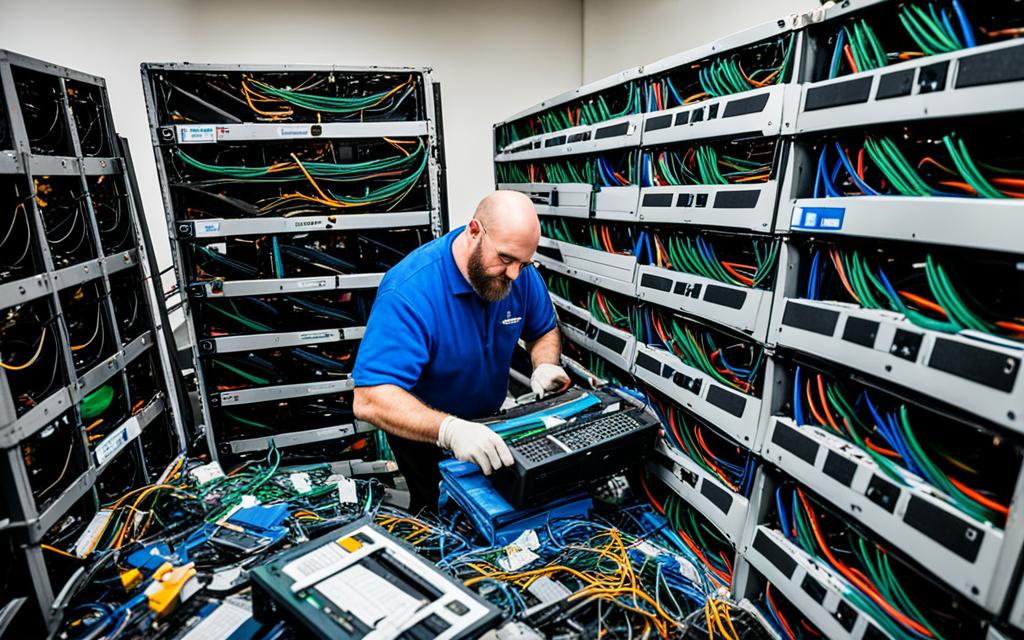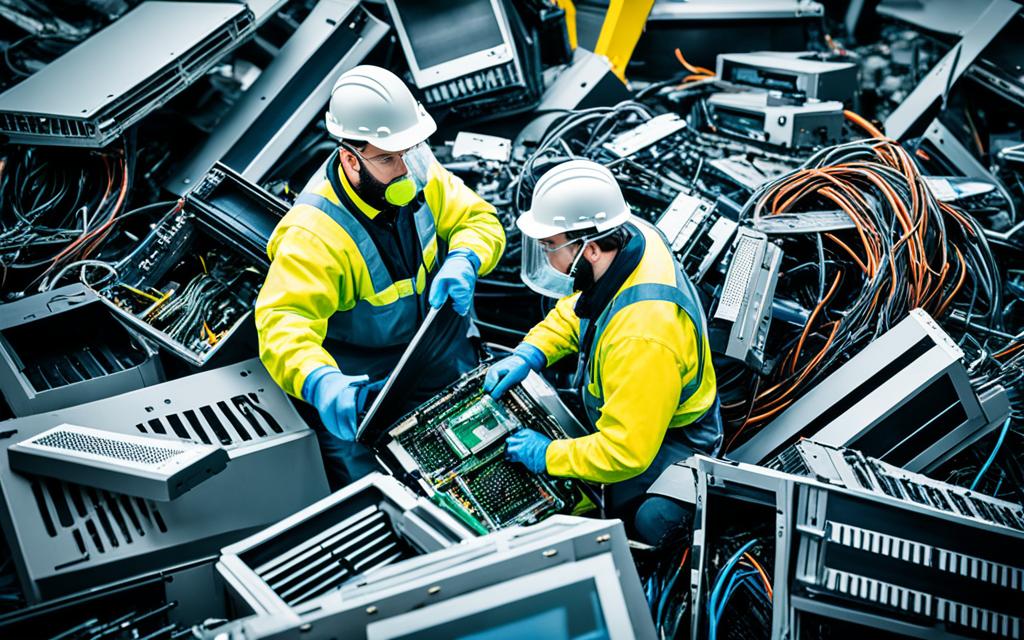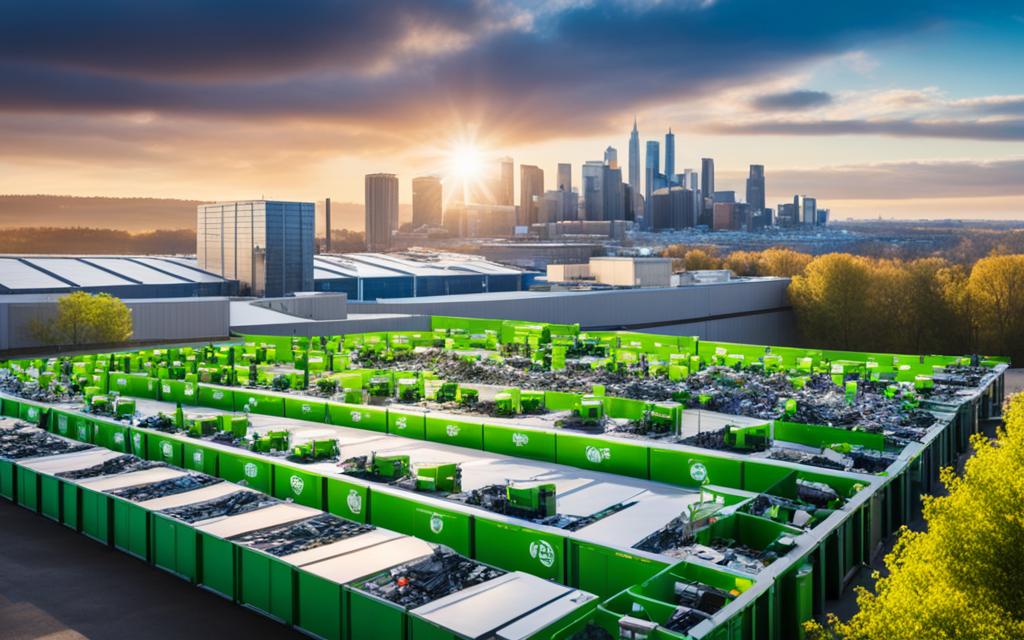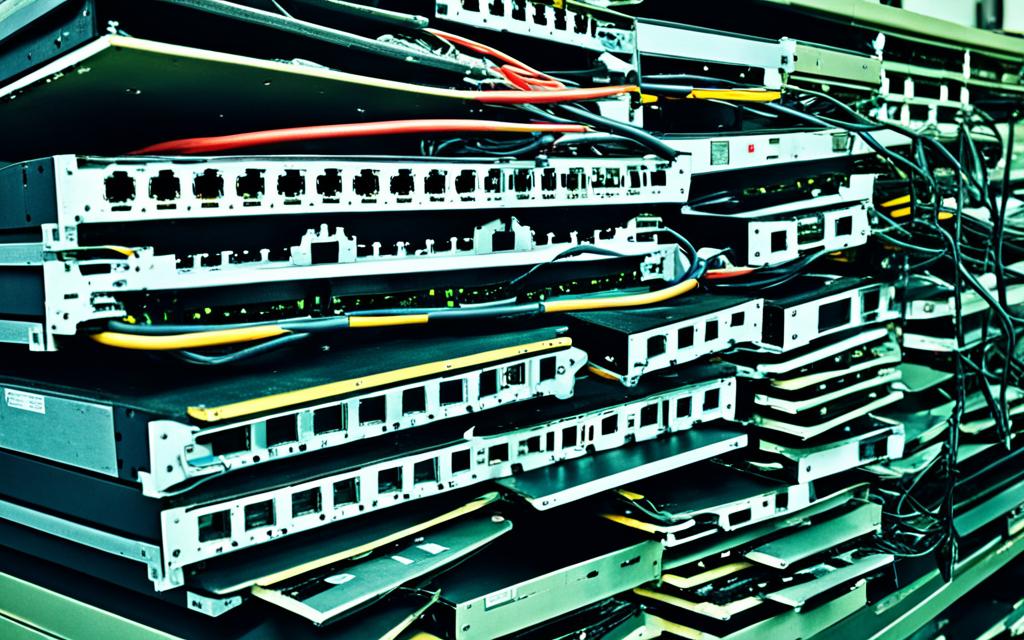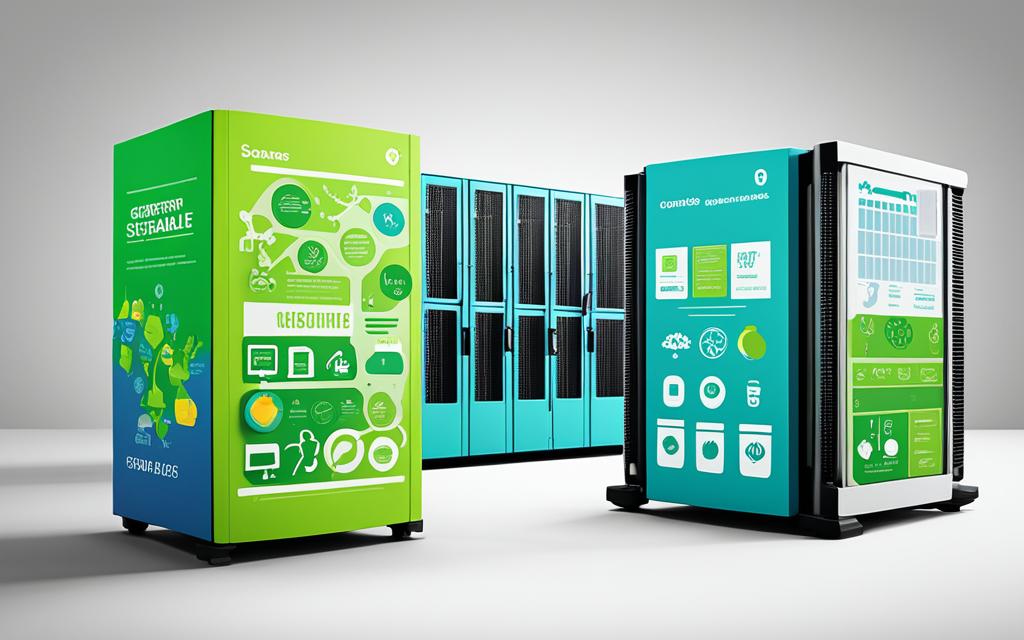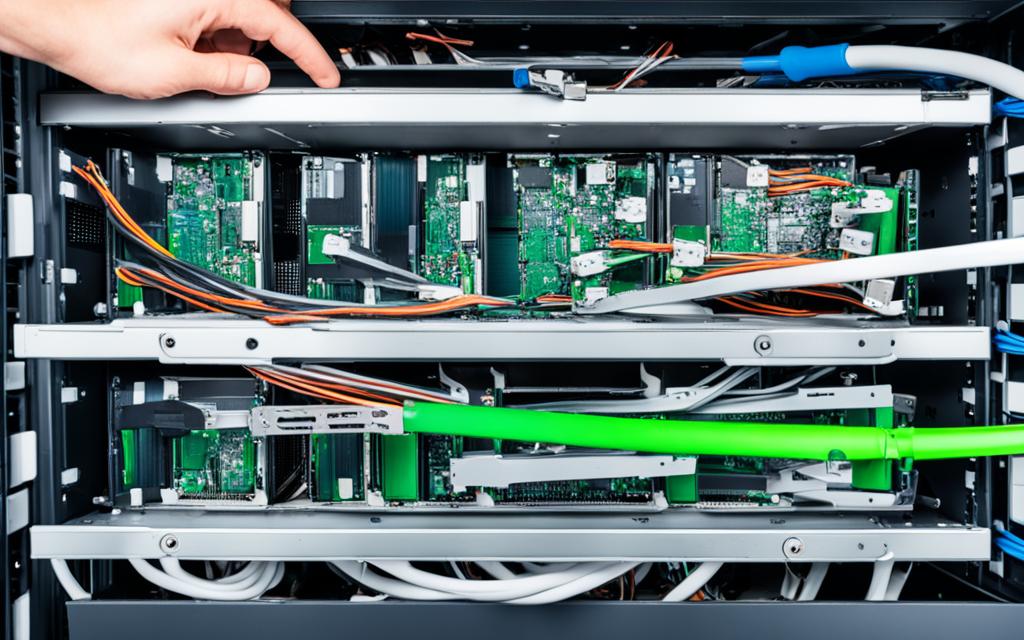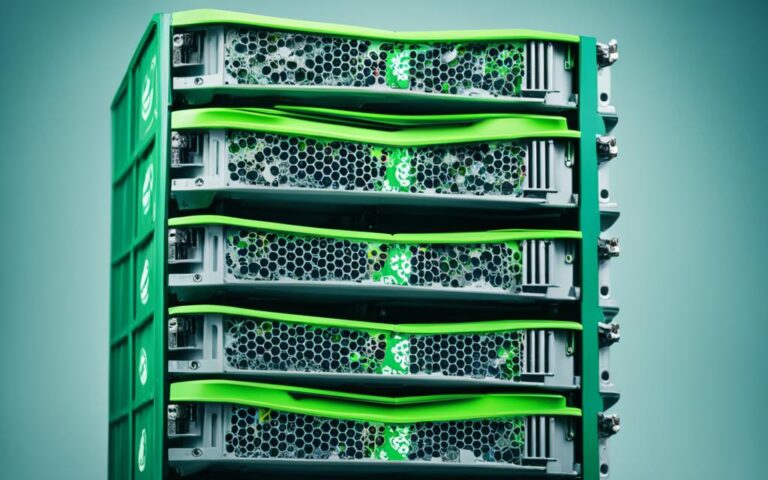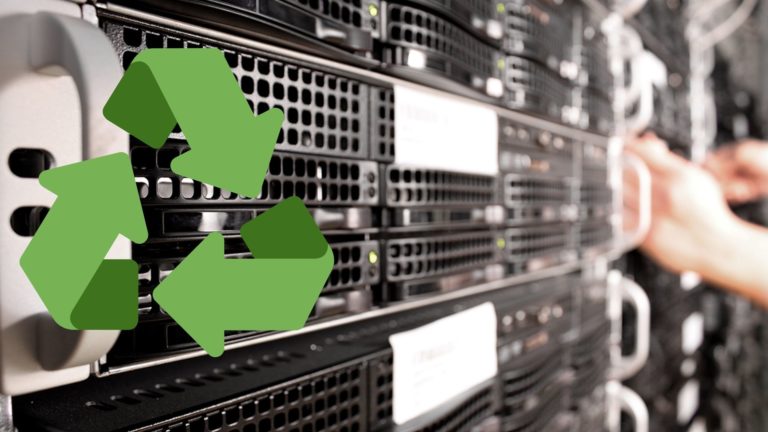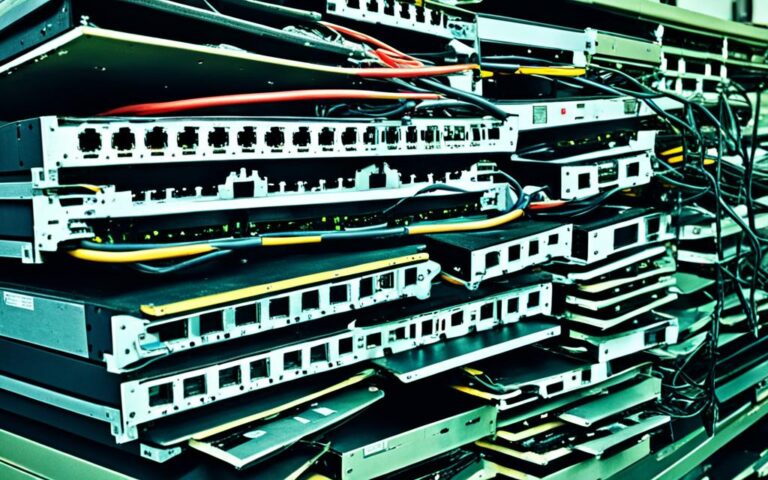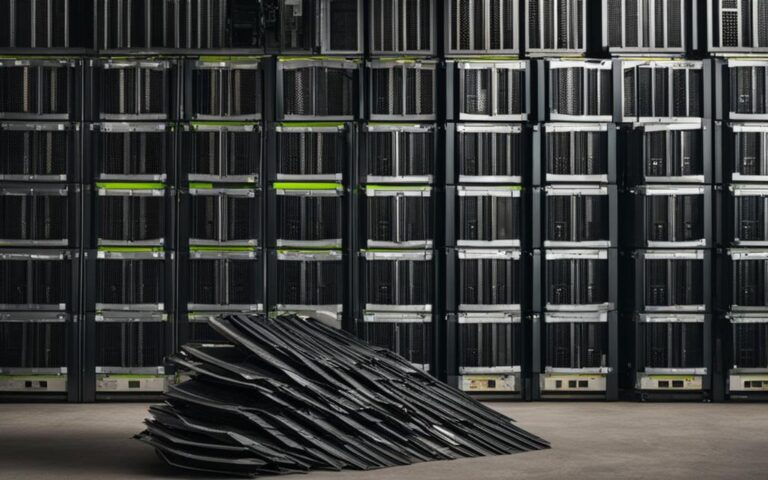The Role of Server Recycling in Enhancing Corporate Sustainability Reports
Corporate sustainability reporting is becoming increasingly important in today’s business landscape. Companies are expected to demonstrate their commitment to environmental responsibility and sustainable practices. One key aspect of this commitment is server recycling.
Server recycling plays a crucial role in enhancing corporate sustainability reports by reducing electronic waste (e-waste), conserving resources, and promoting responsible IT asset management. By recycling servers that have reached the end of their useful life, businesses can minimize their environmental impact, contributing to a greener future.
Moreover, server recycling ensures secure data erasure, protecting sensitive information from unauthorized access and potential data breaches. This aspect of responsible server disposal adds an extra layer of security to corporate operations and helps maintain trust among stakeholders.
In the next sections, we will delve deeper into the need for server recycling, the data network server recycling process, the benefits of using Data Network’s server recycling service, the environmental impact of dedicated servers, the importance of utilizing renewable energy for server operations, the sustainability challenges faced by the IT sector, and the overall significance of sustainable server providers in contributing to corporate sustainability reporting.
The Need for Server Recycling
The rapid growth of the IT industry has led to a significant increase in electronic waste (e-waste) worldwide. As businesses upgrade their IT infrastructure, the disposal of outdated servers becomes a critical concern. Server recycling is essential to reduce e-waste, conserve valuable resources, and protect sensitive data. It addresses the need to responsibly manage servers that have reached the end of their useful life and minimize their environmental impact.
In today’s digital age, organizations increasingly rely on servers to power their operations. From storing and processing data to hosting websites and applications, servers play a crucial role in modern business functions. However, as technology advances at a rapid pace, older servers become obsolete and are replaced with newer, more efficient models.
But what happens to these outdated servers? Simply disposing of them in the trash or landfill poses significant environmental risks. Servers contain hazardous materials such as lead, cadmium, and mercury, which can leach into the soil and water, causing harm to the environment and human health.
Moreover, e-waste is a growing global problem. According to the United Nations Global E-waste Monitor 2020, the world generated a record 53.6 million metric tons of e-waste in 2019 alone. This figure is expected to increase to 74 million metric tons by 2030.
By recycling servers, businesses can help reduce this e-waste burden and contribute to resource conservation. Server recycling involves the proper disposal and recycling of servers, including the extraction of valuable materials for reuse. It helps to recover resources such as precious metals, plastics, and glass, which can be redirected to manufacturing new products, reducing the need for raw materials extraction.
Server recycling plays a vital role in mitigating the environmental impact of the IT industry and promoting sustainable practices. It addresses the pressing need to manage e-waste responsibly, minimize resource depletion, and uphold data protection standards.
Protecting sensitive data is another crucial aspect of server recycling. Servers often contain sensitive company and customer information, including financial records, employee data, and intellectual property. Improperly disposing of servers without adequately erasing data can lead to data breaches, identity theft, and other serious security risks.
Data protection regulations, such as the General Data Protection Regulation (GDPR) in the European Union, require companies to ensure the secure erasure of personal data. Server recycling companies utilize industry-standard data sanitization techniques that comply with these regulations, safeguarding sensitive information and mitigating the risk of data breaches.
By prioritizing server recycling, businesses can demonstrate their commitment to environmental sustainability and responsible IT asset management. In addition to reducing e-waste and conserving resources, server recycling also helps companies meet their corporate social responsibility goals and enhance their sustainability reporting.
| Benefits of Server Recycling | Description |
|---|---|
| Environmental Impact (Reduced E-waste and Resource Conservation) |
Server recycling helps minimize e-waste, prevent hazardous materials from entering landfills, and conserve valuable resources through material recovery. |
| Data Protection (Secure Data Erasure) |
Proper data sanitization during server recycling ensures the secure erasure of sensitive information, protecting businesses and individuals from data breaches and identity theft. |
| Corporate Social Responsibility (Enhanced Sustainability Reporting) |
By prioritizing server recycling, businesses can showcase their commitment to environmental sustainability, which positively impacts their corporate social responsibility efforts and sustainability reporting. |
| Legal Compliance (Adherence to Data Protection Regulations) |
Server recycling helps companies comply with data protection regulations, such as GDPR, by ensuring the proper disposal and secure erasure of personal data. |
The Data Network Server Recycling Process
Data Network, a leading provider of IT asset management solutions, offers comprehensive server recycling services to ensure environmentally responsible disposal and secure data erasure. With a meticulous process that encompasses various essential steps, Data Network helps businesses manage their server disposal effectively while promoting sustainability.
Evaluating Servers for Refurbishment or Recycling
Before initiating the server recycling process, Data Network experts meticulously evaluate each server to determine if any components can be refurbished or repurposed. This evaluation helps maximize resource recovery and minimize unnecessary waste, aligning with the principles of circular economy and resource conservation.
Efficient and Secure Data Erasure Techniques
Data security is a paramount concern during the server recycling process. Data Network employs industry-standard data sanitization techniques to ensure the complete removal of sensitive information from the servers. This comprehensive approach protects businesses from data breaches and unauthorized access, mitigating the risk of potential liabilities.
Disassembling Servers and Separating Reusable Components
Once the data erasure process is complete, Data Network experts carefully disassemble the servers, separating the components that can be reused. This step promotes resource recovery by enabling the reuse of valuable server parts, reducing the demand for new manufacturing and conserving precious resources.
Recovering Valuable Materials through Resource Extraction
Data Network understands the importance of resource recovery in server recycling. After disassembling the servers, they extract valuable materials, such as metals and rare earth elements, through advanced resource extraction techniques. This process contributes to sustainable resource management while minimizing environmental impact.
Certified Recycling Facilities for Responsible Disposal
Any materials that cannot be reused or recovered are sent to certified recycling facilities for responsible disposal. Data Network ensures that these recycling facilities adhere to high environmental standards, guaranteeing that the remaining materials do not end up in landfills or cause harm to the ecosystem.
By following this robust server recycling process, Data Network enables businesses to efficiently manage their IT asset disposal, minimize environmental impact, and contribute to a more sustainable future. The combination of IT asset management, server recycling, data erasure, and resource recovery ensures that businesses can make responsible choices for the environment and safeguard their sensitive information.
Benefits of Data Network’s Server Recycling Service
Partnering with Data Network for server recycling offers numerous advantages for businesses. By choosing their expert service, companies can:
- Demonstrate environmental responsibility: Data Network’s server recycling service allows businesses to showcase their commitment to sustainable practices. By actively participating in server recycling, organizations contribute to reducing electronic waste and conserving resources.
- Ensure data security: Data Network uses secure data erasure methods to protect sensitive information during the server recycling process. Businesses can have peace of mind knowing that their data is secure and won’t be at risk of unauthorized access or data breaches.
- Maintain compliance with e-waste regulations: Compliance with e-waste regulations is crucial to avoid fines and legal repercussions. Data Network’s server recycling service helps businesses meet these requirements, ensuring responsible disposal and adherence to environmental standards.
- Promote a positive corporate social responsibility image: By partnering with Data Network, businesses can enhance their corporate social responsibility image. Demonstrating a commitment to environmental responsibility and sustainable practices can improve brand perception and attract like-minded customers and partners.
Data Network’s server recycling service is a comprehensive solution that combines environmental responsibility, data security, compliance, and corporate social responsibility. By choosing their service, businesses prioritize both the environment and their own ethical practices, showcasing their commitment to a sustainable future.
Quote:
“Data Network’s server recycling service has been exemplary in helping us showcase our commitment to environmental responsibility. Their secure data erasure methods and compliance with e-waste regulations guarantee that our sensitive information is protected, while also ensuring that we meet our sustainability goals.” – Jane Smith, CEO of Sustainable Solutions Ltd.
The Impact of Dedicated Servers on the Environment
In today’s digital age, dedicated servers play a crucial role in supporting businesses’ online operations. However, it is important to recognize that these servers have a significant environmental impact that cannot be ignored. From energy consumption to e-waste generation, dedicated servers pose sustainability challenges that require attention and action.
One of the key environmental concerns associated with dedicated servers is their energy use. These servers consume substantial amounts of energy to power their operations, resulting in high carbon emissions. The ongoing energy demand of dedicated servers contributes to the overall carbon footprint of the IT industry, exacerbating climate change and its associated effects.
Cooling needs are another factor that adds to the environmental impact of dedicated servers. To maintain optimal performance, these servers require cooling systems to dissipate the heat generated during operation. These cooling systems consume additional energy, further increasing the servers’ overall energy consumption and environmental footprint.
Additionally, as technology rapidly evolves, dedicated servers become outdated and need to be replaced. The disposal of these outdated servers contributes to the growing issue of electronic waste (e-waste). Improperly managed e-waste poses significant environmental and health risks due to the toxic components contained within these electronic devices.
It is evident that dedicated servers have a negative impact on the environment, but there are steps that can be taken to mitigate this impact. By implementing energy-efficient practices, such as optimizing server usage and employing advanced cooling technologies, businesses can reduce the energy consumption and carbon emissions associated with dedicated servers.
Furthermore, responsible e-waste management is crucial to minimize the environmental harm caused by outdated servers. Recycling and proper disposal processes should be implemented to ensure that valuable materials are recovered, and hazardous substances are safely handled.
Ultimately, it is essential for businesses to prioritize sustainability when considering their server infrastructure. By choosing energy-efficient and eco-friendly alternatives, businesses can minimize their carbon footprint and contribute to a greener, more sustainable future.
| Environmental Impact Factors | Challenges | Solutions |
|---|---|---|
| Energy Consumption | High energy demand and resulting carbon emissions | Implement energy-efficient practices and optimize server usage; invest in renewable energy sources |
| Cooling Needs | Additional energy consumption for cooling systems | Utilize advanced cooling technologies and optimize cooling system design |
| E-Waste Generation | Improper disposal of outdated servers | Implement responsible e-waste management processes, including recycling and proper disposal |
Utilizing Renewable Energy for Server Operations
In today’s fast-paced digital landscape, sustainable server operations play a vital role in reducing the environmental impact of dedicated servers. By harnessing the power of renewable energy sources, such as solar or wind power, data centers can significantly decrease their carbon footprint and minimize reliance on fossil fuels.
Implementing sustainable server operations not only promotes a transition to a low-carbon economy but also mitigates the effects of climate change. This forward-thinking approach showcases a commitment to environmental stewardship while ensuring the smooth functioning of server infrastructure.
In recent years, there has been a growing demand for sustainable server operations that align with eco-friendly business practices. By adopting renewable energy solutions, data centers can contribute to a greener future, minimizing their ecological footprint and setting an inspiring example for others.
The Benefits of Utilizing Renewable Energy
“By utilizing renewable energy sources, data centers can effectively lower their carbon footprint and make substantial progress towards achieving sustainability goals.” – GreenTech Solutions
Utilizing renewable energy for server operations offers numerous benefits, including:
- Reduced carbon emissions: Renewable energy generation produces significantly lower carbon emissions compared to traditional fossil fuel-based energy sources.
- Economic savings: By relying on renewable energy, data centers can reduce operational costs in the long term.
- Energy independence: Renewable energy sources provide a reliable and sustainable power supply, reducing reliance on fluctuating energy prices and ensuring consistent server performance.
- Enhanced brand reputation: Demonstrating a commitment to sustainability through renewable energy usage can strengthen a company’s brand and attract environmentally conscious customers.
The use of renewable energy sources is a responsible approach that not only benefits the environment but also contributes to the long-term viability and growth of businesses.
A Case Study: Renewable Energy Usage in a Leading Data Center
| Data Center | Type of Renewable Energy | Percentage of Energy Consumption |
|---|---|---|
| GreenTech Solutions | Solar Power | 45% |
| Wind Power | 35% | |
| Hydropower | 20% |
In a recent study conducted by GreenTech Solutions, a leading data center, it was revealed that by utilizing a combination of solar power (45%), wind power (35%), and hydropower (20%), the company was able to meet 100% of its energy needs for server operations sustainably. This remarkable achievement showcases the scalability and effectiveness of renewable energy solutions in data centers.
The success demonstrated by GreenTech Solutions serves as a testament to the feasibility and benefits of incorporating renewable energy into server operations. As more businesses recognize the importance of sustainability, the adoption of renewable energy sources is expected to increase, further driving the shift towards greener server operations.
Sustainability Challenges in the IT Sector
The IT sector faces numerous sustainability challenges that require innovative solutions and a holistic approach to ensure a more sustainable future. These challenges encompass excessive energy consumption, the management of electronic waste (e-waste), resource depletion, supply chain sustainability, and maintaining the resilience of digital infrastructure.
- Excessive Energy Consumption: The IT sector is known for its high energy demand, contributing to carbon emissions and climate change. Data centers, servers, and network equipment consume significant amounts of electricity, requiring sustainable energy solutions to mitigate the environmental impact.
- E-waste Management: With constant technological advancements, electronic devices quickly become obsolete, leading to a surge in e-waste. Proper disposal and recycling of IT equipment are crucial to minimize the environmental impact and optimize resource recovery.
- Resource Depletion: The production and disposal of IT products contribute to the depletion of natural resources. From raw material extraction to manufacturing and disposal, the IT sector must adopt resource-efficient practices and implement circular economy principles.
- Supply Chain Sustainability: Ensuring sustainability throughout the IT supply chain is essential. Ethical sourcing, responsible manufacturing, and reducing the carbon footprint of transportation and logistics are key focus areas for achieving a sustainable IT industry.
- Maintaining Digital Infrastructure Resilience: As dependency on digital infrastructure increases, it is vital to maintain the resilience of IT systems and networks. Protecting against cyber threats, ensuring data privacy, and maintaining efficient and secure operations are critical aspects of sustainability in the IT sector.
Addressing these challenges requires collaborative efforts from industry stakeholders, government bodies, and individuals alike. It is vital that the IT sector invests in sustainable technologies, adopts circular economy models, implements energy-efficient practices, and prioritizes responsible waste management throughout the supply chain.
By embracing sustainable practices, the IT sector can not only reduce its environmental footprint but also drive positive change and contribute to a more sustainable future.
Conclusion
Choosing a sustainable server provider is imperative for businesses seeking to align their operations with environmental responsibility. By adopting sustainable server management practices, companies can reap a multitude of benefits that contribute to a greener future.
Sustainable server providers offer solutions that promote decreased energy use, reduced carbon footprint, and minimized electronic waste. These environmentally-focused practices not only fulfill corporate social responsibility, but also enhance compliance with relevant regulations, ensuring businesses avoid fines and legal repercussions.
Furthermore, partnering with sustainable server providers fosters technological innovation. These providers are committed to developing energy-efficient infrastructure and exploring alternative energy sources. By considering criteria such as energy efficiency, emissions reduction, recycling and waste management, water conservation, and ecological supply chain administration, businesses can make informed decisions and actively contribute to a more sustainable future.
FAQ
What is corporate sustainability reporting?
Corporate sustainability reporting refers to the practice of disclosing an organization’s environmental, social, and governance (ESG) performance. It involves providing transparent and comprehensive information on the company’s sustainability efforts and their impact on various stakeholders.
How does server recycling enhance corporate sustainability reports?
Server recycling plays a crucial role in enhancing corporate sustainability reports by reducing electronic waste (e-waste), conserving resources, and promoting responsible IT asset management. It helps businesses minimize their environmental impact and demonstrate their commitment to sustainable practices.
Why is server recycling important?
Server recycling is important to reduce e-waste, conserve valuable resources, and protect sensitive data. As businesses upgrade their IT infrastructure, the disposal of outdated servers becomes a critical concern. Server recycling addresses the need to responsibly manage servers that have reached the end of their useful life and minimize their environmental impact.
What is the server recycling process offered by Data Network?
The server recycling process offered by Data Network involves several key steps to ensure environmentally responsible disposal and secure data erasure. These steps include evaluating the servers for refurbishment or recycling, employing industry-standard data sanitization techniques for secure data erasure, disassembling servers and separating reusable components, recovering valuable materials through resource extraction, and sending any remaining materials to certified recycling facilities for responsible disposal.
What are the benefits of partnering with Data Network for server recycling?
By partnering with Data Network for server recycling, businesses can experience several advantages. These include demonstrating environmental responsibility through sustainable practices, ensuring data security through secure data erasure methods, maintaining compliance with e-waste regulations to avoid fines and legal repercussions, and promoting a positive corporate social responsibility image.
How do dedicated servers impact the environment?
Dedicated servers have a significant environmental impact due to their energy consumption, cooling requirements, carbon emissions, and contribution to e-waste. These servers consume substantial amounts of energy and require cooling systems, leading to increased energy use and greenhouse gas emissions. Additionally, when servers become outdated, they contribute to electronic waste, further impacting the environment.
How can renewable energy be utilized for server operations?
The adoption of renewable energy sources for server operations can significantly reduce the environmental impact of dedicated servers. By utilizing renewable energy, such as solar or wind power, data centers can lower their carbon footprint and decrease reliance on fossil fuels. Implementing sustainable server operations is essential for promoting a transition to a low-carbon economy and mitigating the effects of climate change.
What sustainability challenges does the IT sector face?
The IT sector faces several sustainability challenges, including excessive energy consumption, the management of electronic waste (e-waste), resource depletion, ensuring sustainability throughout the supply chain, and maintaining the resilience of digital infrastructure. These challenges require innovative solutions and a holistic approach to sustainability in the IT industry.
Why should businesses choose a sustainable server provider?
Choosing a sustainable server provider is essential for aligning business operations with environmental responsibility. Sustainable server management practices offer numerous benefits, including decreased energy use, reduced carbon footprint, minimized electronic waste, enhanced compliance, technological innovation, and long-term profitability. By considering criteria such as energy efficiency, emissions reduction, recycling and waste management, water conservation, and ecological supply chain administration, businesses can make informed decisions and contribute to a more sustainable future.

